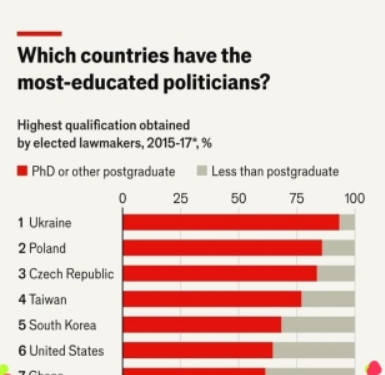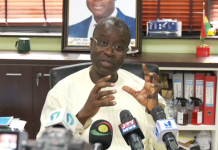Ghana has secured the 7th spot in a global ranking of countries with the most educated politicians, according to a recent report based on studies conducted by researchers from leading universities.
The analysis, which examines the education levels of lawmakers, provides valuable insight into the academic qualifications of elected representatives across 56 countries with populations over two million.
The report, derived from data collected in 2015, 2017, and 2023, relies on the Global Legislators Database, which tracks the highest academic qualifications held by elected officials.

Notably, the study revealed that 78% of parliamentarians globally possess at least a bachelor’s degree, with 40% holding postgraduate degrees far exceeding the global average education levels of the general population. In Ghana’s case, the findings highlight a notable trend of well-educated lawmakers, reinforcing the country’s significant position in the global political landscape.
Ukraine tops the list, followed by Poland in second place and the Czech Republic in third. Other countries rounding out the top ten include Taiwan, South Korea, and the United States. Ghana ranks 7th, placing ahead of Slovenia, and reflecting a growing emphasis on educational qualifications within its political sphere.

This global study is based on two major datasets. The first, compiled by researchers from six global universities, analyzes biographical data from nearly 20,000 parliamentarians across 97 countries between 2015 and 2017.
This is the most comprehensive study of its kind, capturing valuable data about the educational backgrounds of lawmakers and revealing significant patterns. The second study, conducted by researchers in Chile, focused on 6,000 legislators from nearly 30 countries in 2023, offering a more recent snapshot of the educational makeup of national parliaments.
The data from these studies show that Ukraine leads the pack with nearly a quarter of its lawmakers holding doctoral degrees, which is a longstanding trend in the country.
Academic titles have long been valued in Ukrainian politics, with all presidents since independence (except Volodymyr Zelenskyy) holding doctoral degrees. South Korea and the U.S. also stand out, with nearly a third of South Korean legislators holding doctorates, while more than two-thirds of U.S. legislators have postgraduate qualifications.
In contrast, countries like Italy, Norway, and the UK show a lower proportion of highly educated parliamentarians. For example, UK Speaker Sir Lindsay Hoyle rose to prominence without attending university, and prominent Italian politicians like Luigi Di Maio and Matteo Salvini did not complete their university degrees.
While having highly educated politicians has been seen as an indicator of advanced political structures, studies suggest that education does not necessarily correlate with better political performance.
Research examining U.S. lawmakers over the 20th century found that college-educated members did not perform significantly better than their less-educated counterparts in areas such as passing legislation, winning re-election, or serving longer terms.
Similarly, a study in Spain revealed that mayors with degrees did not show superior results in key areas such as reducing unemployment or improving city budgets.
Despite this, the trend of having a more educated parliament is gaining traction globally. The second study, which explored legislative trends in Latin America and North America, revealed that law degrees dominate in these regions, while Nordic countries favor politicians with backgrounds in social sciences like economics.
The UK is noted for electing an unusually high number of legislators with degrees in the arts and humanities, such as history or classics.
The shift towards higher educational qualifications among politicians is transforming national legislatures, though it also raises concerns.
As political representatives become increasingly educated, there is a growing perception of a disconnect between lawmakers and the broader electorate.
Political analysts warn that the trend toward more elitist representation could lead to a situation where ordinary citizens feel less represented and less motivated to vote, especially if they see fewer people who share their life experiences and educational backgrounds on the ballot.
Overall, while the education levels of politicians globally have risen, the real impact of this trend on political performance and public trust remains to be seen.
However, it is clear that education is becoming an increasingly important factor in shaping the political leadership of nations, including Ghana.
























































![[FREE FREE MONEY] Predict and Win a Guaranteed GH¢200 From Us EVERY WEEK](https://wordpress.ghanatalksradio.com/wp-content/uploads/2022/02/Predict-and-Win-Final-09-03-2021-218x150.jpg)
![[Predict & Win – 8th/Oct.] WIN A Guaranteed ¢200 From Us This Week](https://wordpress.ghanatalksradio.com/wp-content/uploads/2021/10/maxresdefault-16-218x150.jpg)
![[Predict & Win – 2nd] WIN A Guaranteed ¢200 From Us This Week](https://wordpress.ghanatalksradio.com/wp-content/uploads/2021/09/maxresdefault-50-218x150.jpg)
![[Predict & Win – 25th] WIN A Guaranteed ¢200 From Us This Week](https://wordpress.ghanatalksradio.com/wp-content/uploads/2021/09/maxresdefault-36-218x150.jpg)
![[Predict & Win – 18th] WIN A Guaranteed ¢200 From Us This Week](https://wordpress.ghanatalksradio.com/wp-content/uploads/2021/09/maxresdefault-23-218x150.jpg)









![[National cathedral] See full list of churches that have contributed since 2018](https://wordpress.ghanatalksradio.com/wp-content/uploads/2020/09/Ghana-National-Cathedral-GhanaTalksRadio-100x70.jpg)



